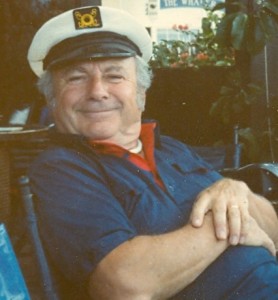The Project
 Barely able to stand, eye level with the keyboard, unsteadily clinging to the leg of our old upright piano, I imprinted on the rollicking, ground shaking rhythms of the venerable stride playing of my father, George Gillette.
Barely able to stand, eye level with the keyboard, unsteadily clinging to the leg of our old upright piano, I imprinted on the rollicking, ground shaking rhythms of the venerable stride playing of my father, George Gillette.
He was someone who saw the music as a salvation from the stresses of the day, not as a way to make a living. Oddly, because of and at the same time in spite of his influence, I tested that prejudice, and have made so many friends among the free souls who have chosen “the life.” Many have gone on before, and many have joined us here.
In this photo of him, taken in Hawaii, he could be ‘Old Jack’ himself. It is his piano that stands in for Jack on the recording, and it’s much of his wit and style that illuminates Jack’s personality in the slowly progressing pages of the book version of “The Man.” To learn more about his life and to read a little of his own writing look in on the page for him in the section on the musicians.
The title, “The Man,” has so many meanings, “you the man,” the boss, FDR, Lindbergh, the police, etc. But in this case I mean my father, the man who gave me my initiation into the world of Fat’s Waller, W.C. Handy, Hoagy Charmichael, Bessie Smith, Jelly Roll Morton, and so many others. These were the creators of the music of his impressionable years. It was his mother, Babe, who taught him to play “Dark Town Strutter’s Ball.” She played the ragtime standards in her teen-age days, and it’s her era that is really closer to the center of this project.
The story and narration were just the natural unfolding of the fantasies of that world, some from as far back as that three-year-old’s first impressions. The more one looks into that world, the richer the detail, the more compelling the human story, and the more rewarding the understanding of music and soulful living. Much of it done against the grain of prejudice, repression and prohibition. The spirit of this music has proclaimed something about the human condition that was so obvious to a three year old, that it doesn’t seem to need explanation. Maybe the music will say it better than I can.
“The Man,” is about the first freedom – the freedom to be true to one’s self. Shakespeare had Hamlet agonize about what it might mean. In the struggle to create our democracy, Thomas Paine wrote in The Rights of Man, “Toleration is not the opposite of intoleration, but is the counterfeit of it. Both are despotisms. The one assumes to itself the right of withholding liberty of conscience, and the other of granting it.” As Danny’s adopted father, Old Jack would say, “You’ve got to respect the other man’s heart.”


